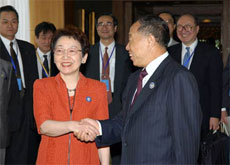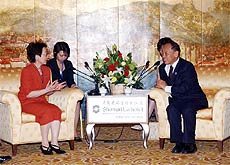The Japan-China Foreign Ministers' Meeting on the occasion of the Asia Cooperation Dialogue (ACD) Meeting
(Summary)


June 21, 2004
On June 21, 2004, Minister for Foreign Affairs Yoriko Kawaguchi who was visiting Qingdao City, China to attend the Asia Cooperation Dialogue (ACD) Meeting held a Japan-China Foreign Ministers' Meeting with Minister of Foreign Affairs Li Zhaoxing of the People's Republic of China (PRC) for approximately an hour. The following is a summary of the meeting. (Attendants: Japanese side: Ambassador Koreshige Anami to the PRC, Director-General Mitoji Yabunaka of the Asian and Oceanian Affairs Bureau and others; Chinese side: Assistant Minister of Foreign Affairs Shen Guofang and others)
1. Opening
Foreign Minister Li expressed his appreciation for Foreign Minister Kawaguchi conveying her condolences by telephone at the time of the death of the Chinese nationals in a terrorist attack in Afghanistan. Foreign Minister Kawaguchi stated that the sad incident should not have occurred. Foreign Minister Li stated his intention for China to remain in Afghanistan and continue its efforts for the reconstruction of Afghanistan and expressed his wish for bilateral cooperation between Japan and China on this matter.
2. Japan-China Relations
Foreign Minister Kawaguchi stated that Japan and China currently enjoy very sound relations and that the trade and flow of people between Japan and China is showing a steady increasing trend. However, at the same time, various outstanding issues exist between Japan and China, and thus there is a need for the foreign officials of both countries to fully understand and employ measures to resolve these issues. Japan intends to engage in further efforts with the realization that Japan and China mutually resolving the various issues between them and thus formulating good relations is vital for the peace and stability of both the Asian region and the world.
Foreign Minister Kawaguchi noted that exchanges such as the Grand Sumo Tournament that recently took place in China are important from the perspective of promoting exchanges between Japan and China. She then remarked that from the aspect of expanding high-level exchanges, Japan would highly welcome a visit by State Councilor Tang Jiaxuan of the PRC to Japan and requested the Chinese side to give such a visit positive consideration. Further, there will be three occasions until this fall where both leaders of Japan and China are scheduled to attend the same international conferences. Japan wishes to realize summit meetings given such opportunities.
Foreign Minister Li expressed his gratitude for the generous words of Foreign Minister Kawaguchi. He stated that China highly values friendly relations between Japan and China and that their common interests and mutual understanding have grown. At the same time, economic and trade relations are also showing further development.
On the other hand, historical issues and the issue of Taiwan remain between Japan and China. As for historical issues, Foreign Minister Li noted that the fundamental stance that shall be taken in resolving the issues would be in the spirit of "taking history as a mirror, and looking toward the future." Foreign Minister Li shared with Foreign Minister Kawaguchi the impression he received as he watched on television as Chancellor Gerhard Schroeder of the Federal Republic of Germany attended the joint ceremonies commemorating the 60th anniversary of the Allied invasion of Normandy and analyzed the Chancellor's attendance as a result of Germany being able to naturally and flexibly face its history. He further remarked that as an observer and as a friend to Japan, he believes that Japan could take the case of Germany as a source of reference.
Foreign Minister Li further expressed his gratitude for numerous invitations extended to State Councilor Tang to visit Japan. He continued that the Chinese side also places much value on high-level exchange, and thus would seriously take into consideration the visit to Japan by State Councilor Tang.
Foreign Minister Kawaguchi shared her view that Japan and China both are seeking future-oriented relations and efforts to this end are necessary. She further agreed on the importance of the idea "taking history as a mirror, and looking toward the future."
Currently, the Korean TV drama series "Winter Sonata (Fuyu no Sonata)" is very popular in Japan. When the live telecast of baseball games goes overtime, causing delays in showing the "Winter Sonata," the viewers call in to make complaints. Foreign Minister Kawaguchi stated her wish that the Japanese people would also gain an interest in Chinese dramas as well.
Foreign Minister Kawaguchi pointed out that although the case of Germany had been raised, the awareness and understanding on history by the Japanese people remains as was stated in the statement made by former Prime Minister Tomiichi Murayama. Japan has clearly delivered to the world this statement and understands that it is being positively evaluated on this. There have been no changes made to the position of the Government of Japan as defined in Murayama statement.
Foreign Minister Li concurred on the enhancement of cultural exchanges between Japan and China. As for the topic of television broadcasting in Japan, he expressed his love for baseball and admitted that he could easily watch nine straight games of baseball. Even so, he added that if a television drama series with Japan-China friendly relations as its theme were to be broadcast, he would watch the drama over baseball game. He was enthusiastic in enhancing sports and cultural exchanges.
3. Taiwan Issue
Taiwan is another gravely important and sensitive issue. Regardless of the rhetoric of Taiwanese administration, there has been no change to their policy for independence and still continuing activities that would facilitate division of the home country. Foreign Minister Li stated that this point should be clearly noted and requested Japan not to send wrong messages to Taiwan. Foreign Minister Li also requested Japan to respect and abide by the principles and spirit of the three basic documents of Japan-China relations.
With regard to Japan's relation with Taiwan, Foreign Minister Kawaguchi stated that as has been expressed on many occasions, there have been no changes made in Japan's position on maintaining a working relationship on a non-governmental basis, based on the Japan-China Joint Communique.
4. Development of Resources in the East China Sea
Foreign Minister Kawaguchi addressed the issue of resources development in the East China Sea in the interest of realizing progress in Japan-China relations. There is a possibility that a part of the mining zone that China established in the East China Sea is extending to the east of the median line boundary line. Furthermore, concerning "Chunxiao," "Duanqiao" and the "partial structure at Longjing," due to the geologic structure they are extending to the east of the median line, raising the possibility of mining and extraction of resources which belong to the east of the median line regardless the mining being conducted from the west side of that line. The Government of Japan is gravely concerned at the possibility of Japan's sovereign rights being violated and has requested that the Chinese government should make a prompt response to our repeated demand for provision of information. Foreign Minister Kawaguchi noted that a prompt response from the Chinese side would eliminate Japan's concerns and lead to mutual trust between Japan and China.
Foreign Minister Li stated that "Diao Yu Islands" (left as stated by Foreign Minister Li) is clearly a territory under Chinese control. Bearing in mind historical factors, Foreign Minister Li stated his wish to resolve the issue through negotiation in this time of historical development. In the process of reaching a resolution both Japan and China should refrain from unilateral action and Foreign Minister Li stated that China takes an attitude of restraint.
With regard to the development of resources in the East China Sea, differences exist in the maritime boundary delimitation between Japan and China, and Foreign Minister Li stated that he sought a resolution through mutual consultations. Although not acknowledged the claims made by Japan regarding median line, Foreign Minister Li suggested joint development in the interest of Japan-China relations and long-term benefit by disregarding the differences in opinions in order to resolve the regional issue. He requested the Japanese side to give consideration to his suggestion.
Foreign Minister Kawaguchi emphasized that the idea of joint development proposed by Foreign Minister Li would not progress unless Japan was provided with the information it had been requesting in relation to this issue. The Japanese side would like to first study the information upon receiving it from the Chinese side. She further expressed her wish for contacts being kept between the Ministry of Foreign Affairs of Japan and China. (To this, Foreign Minister Li responded in English, "Let's keep in touch.")
The position of Japan over the Senkaku Islands has been stated on various occasions, and Foreign Minister Kawaguchi stated her wish for China to calmly consider the issue.
(In addition, Foreign Minister Li stated that China places extreme value on the ACD Meeting and wished to gain cooperation from the Japanese side. To this, Foreign Minister Kawaguchi shared her view that Japan too sought a successful ACD Meeting.)
Back to Index
